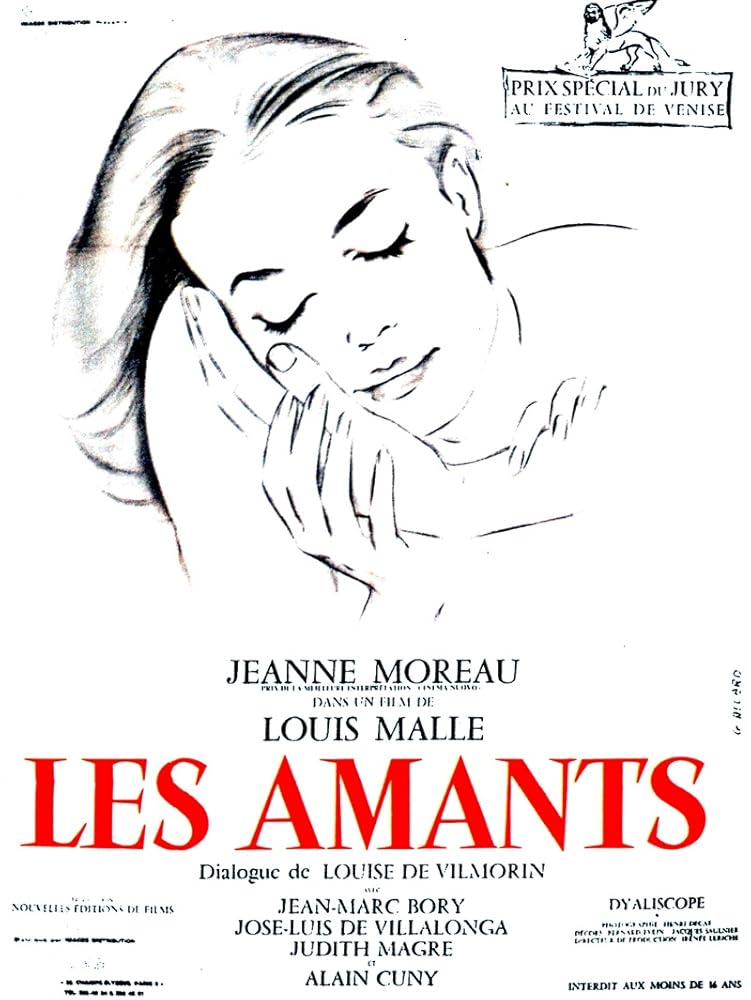
LOVERS, THE (Amants, Les)
(director/writer: Louis Malle; screenwriter: from the novel “Point de Landemain” by Dominique-Vivant/ narration by Louise de Vilmorin; cinematographer: Henri Decaë; editor: Léonide Azar; music: Johannes Brahms; cast: Jeanne Moreau (Jeanne Tournier), Alain Cuny (Henri Tournier), José Villalonga (Raoul Flores), Jean-Marc Bory (Bernard Dubois-Lambert), Judith Magre (Maggy Thiebaut-Leroy), Gaston Modot Coudray, the servant), Michèle Girardon (Helene, La secrétaire); Runtime: 89; MPAA Rating: NR; producer: Irenee Leriche; New Yorker Films; 1958-France-in French with English subtitles)
“The romantic drama is about a good hump going a long way for a horny chic lady.”
Reviewed by Dennis Schwartz
A rather conventional and tedious second feature film from the supposed nouvelle vague French filmmaker Louis Malle (“Pretty Baby”/”Elevator to the Gallows”/”The Fire Within”). Yet the film was popular and served as both actress Jeanne Moreau’s and Malle’s international breakthrough film. It’s based on the 18th-century short story “Point de Landemain” by Dominique-Vivant and is narrated by Louise de Vilmorin. The romantic drama is about a good hump going a long way for a horny chic lady. In its controversial centerpiece scene, Moreau appears in an adulterous tryst half naked while Brahms plays in the background; all this sex got the American censors all lathered up at the time (a Cleveland theatre owner was arrested on an obscenity charge for showing the film and his case went all the way to the Supreme Court).
It’s played out as a superficial study of bourgeois emptiness and sexual pains that fails to lift any of its main characters above their one-dimensional stature, though Moreau wails away at trying to get at her inner character by making all kinds of painful gestures but runs into a wall because the vacuous script lets her down. The film won Special Jury Prize at the Venice Film Festival in 1958, maybe it was because of the shock of nudity in a 1950s film excited the judges or that Moreau’s star quality superseded the banal storyline.
Sensuous but bored wealthy provincial Dijon housewife Jeanne Tournier (Jeanne Moreau), married eight years to courtly but neglectful and dour local newspaper publisher husband Henri (Alain Cuny), flees often to Paris to party with her married and hopelessly empty glib bourgeois girlfriend Maggy (Judith Magre). She’s known Maggy since childhood, and they share their secrets and yearnings. In Paris Jeanne has an on-going affair with suave club polo player and Spanish aristocrat Raoul Flores (José Villalonga), but is not all that thrilled by him even though Maggy tells her any dame (in her circle of dames) would like to hunker down with him. After yapping to hubby too much about him and Maggy as an item, her suspicious hubby persuades her to invite her two friends for dinner at their Dijon estate. While rushing back from Paris to make the supper date her car breaks down and a much younger middle-class archaeologist, Bernard Dubois-Lambert (Jean-Marc Bory), openly mocking the aristocrats, who has relatives in the area and is returning to go on a dig, gives her a ride home and is invited by Henri to stay overnight. During the course of the evening he woos the restless Jeanne on the vast grounds and gives her a good bang, something she evidently needed for a long time. Then impulsively in the morning she packs her suitcase and departs with her new lover, supposedly leaving behind her empty bourgeois life, her hubby and polo lover, and is now heading off with a virtual stranger from a different class for an uncertain future and what she believes is the real thing of love.
Somehow I wasn’t convinced this lustful act was love (But who knows! I’m willing to cut them some slack); for me, the luminous black and white photography of Henri Decaë is the hardest thing to resist in this seductive arty film.
REVIEWED ON 11/1/2007 GRADE: B-